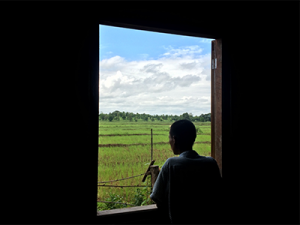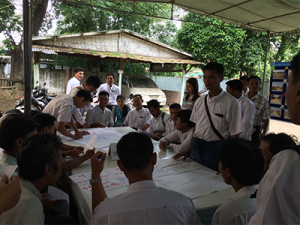Letter Three

In one village, when the men committee members met with me in the afternoon, all the village elders and leaders attended. They did not think it important enough to attend the women’s meeting that morning, I suppose. We sat in the biggest room of a large house about ten feet above ground level. (Most of the houses in villages in Myanmar are balanced on stilts: large wooden posts that keep them above the water during flooding. Climate change is a reality, as flooding continues to get worse, and the stilts grow correspondingly.) In the next room over, the women committee members and other community women sat attentively. A green wire mesh separated the two rooms. The wire appeared to crisscross the women’s faces, and those of their toddlers who sat with them. It felt a little bit like a committee meeting they were locked out of, although they had gotten their equivalent discussion meeting that morning.
I think the third or fourth probing question is where I usually begin to learn the most. We get over the humps of what, how, and when, and then we arrive at the fascinating “why.” Consider the following exchanges:
Would you allow your wife to go to leadership training in town for three days? No, because she has to take care of the kids. Would you let her be on the committee instead of you? No, I want my position. Do you want your daughter to be on the committee? Yes, of course.
Or:
Why is the building more important than water access? It helps the whole community, and might be used as a school in the future. How would water access help women in the community? They would be able to get water more easily. How much time do they spend getting water each day? At least two hours. Would it be more of a benefit to save women two hours per day than to have a community building? No, because women have always collected water like this; they collect it in their free time.
Though I am doing research, not advocacy work, I cannot keep my own views and opinions of gender separate from the thoughts and reflections I have on my experiences in discussions with community women and men.
Men at a multi-stakeholder review, making decisions and evaluating the process of CDD in Kyangin township. These men are all village tract leaders (a VT leader is a leader of a cohort of villages). There are no women among them because, well, leaders are traditionally men. (The CDD project cannot mandate women’s participation outside the project, so often women don’t have pathways to continue their political involvement outside the project.)

The idea that women in the future—but not women now—should have opportunities does not make logical sense to me. The invisibility and devaluation of women’s work and women’s time shocks me; two hours of carrying water is not free time. There is some quote that’s been memed a thousand times that I can’t remember word for word. It is about how we should remember that we are doing this work because of the people who did this kind of work before us. It makes us remember that we are standing on the shoulders of women and men who also believed in what we believe, and they did that work standing on others’ shoulders, and so on and so forth. It also puts into perspective the painfully slow arc of change.
But sometimes it just doesn’t seem fair. Women now should have opportunities, not just women in the future. CDD has only been in the townships we’ve been studying for two years, so of course change isn’t happening in a big way just yet. When I think of two years, compared with hundreds of years of women behind, overshadowed, beneath, and ruled by men, then I’m really encouraged by the small steps forward the project has taken in terms of gender equity.
